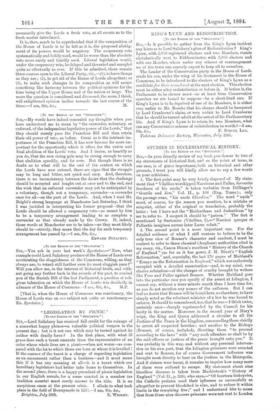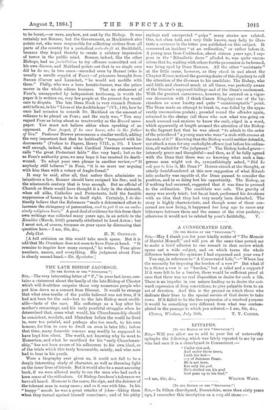STUDIES IN ECCLESIASTICAL HISTORY. [To THE EDITOR OF THE SPECTATOR."]
SIR,—In your friendly review of my book you demur to two of my statements of historical fact, and as the point at issue, in one case, is of grave importance, both on historical and other grounds, I trust you will kindly allow me to say a few words on your criticisms.
1. The first point may be very briefly disposed of. My state- ment that " Vitellius worshipped Narcissus and Pallas, favourite freedmen of his uncle," is taken verbatim from Dollinger's "Gentile and Jew," Vol. II., p. 168 (Eng. Trans.) ; only the passage runs, "his uncle Claudius." The word " uncle " must, of course, for the reason you mention, be a mistake or misprint, either of the original or translation, probably the latter ; but I have not the " Heidenthum mid Judenthum " by me to refer to. I suspect it should be "patron." The fact is mentioned by Suetonius (Vitellius, 2),—" Narcissi quoque et Pallantis imagines aureas inter Lares coluit."
2. The second point is a more important one. For the detailed evidence of what I still venture to believe to be the only true view of Bonner's character and conduct, I must be content to refer to three classical (Anglican) authorities cited in my essay, viz., Canon Dixon's excellent "History of the Church of England" (as far as it has gone), J. H. Blunt's "English Reformation," and, especially, the last 170 pages of Maitland's "Essays on the Reformation in England," which are exclusively occupied with a detailed examination—and, to my mind, con- clusive refutation—of the charges of cruelty brought by writers like Foxe and Fuller against Bonner. Whether Maitland goes into the particular case you specify of the arrest at Islington, I cannot say, without a more minute search than I have time for, as you do not mention any names of the sufferers. But I can feel no doubt that Bonner will be found here, as elsewhere, to have simply acted as the reluctant minister of a law he was bound to enforce. It should be remembered, too, that he was—I think twice, certainly once—sharply reprimanded by the Council for his laxity in the matter. Moreover, in the second year of Mary's reign, the King and Queen addressed a circular to all the Justices of the Peace in the kingdom, commanding them strictly to arrest all suspected heretics ; and another to the Bishops (Bonner, of course, included), directing them "to proceed according to the laws" with "any such offenders as shall be by the said officers or justices of the peace brought unto you." It was probably in this way, and without any personal interven- tion on his own part, that the Islington prisoners were arrested and sent to Bonner, for of course Government influence was brought most directly to bear on the justices in the Metropolis. And if sixteen were burnt, it remains to inquire bow many more of them were suffered to escape. My statement about nine bloodless dioceses is taken from Mackintoslite "History of England" (Vol. II., p. 328), who says,—" Of fourteen bishoprics, the Catholic prelates used their influence so successfully as altogether to prevent bloodshed in nine, and to reduce it within limits in the remaining five ;" and. I understand him to mean that from these nine dioceses prisoners were not sent to London
to be burnt,—or were, anyhow, not sent by the Bishop. It was certainly not Bonner, but the Government, as Mackintosh also points out, who were responsible for collecting victims from all parts of the country for a periodical auto-do-ft at Smithfield, because they hoped thereby to create a salutary impression of terror in the public mind. Bonner, indeed, like the other Bishops, had no jurisdiction to try offences committed out of his own diocese, and Maitland points out that in no single case did he do so ; in two cases—recorded even by Burnet (who is usually a servile copyist of Foxe)—of prisoners brought from Sussex (Carver and Launder), "he would not meddle with them." Philip, who was a born heretic-burner, was the prime mover in the whole odious business. That no statement of Foxe's, unsupported by independent testimony, is worth the paper it is written on, very few people at the present day would care to dispute. The late Dean Hook (a very staunch Protest- ant) tells us, in his "Lives of the Archbishops " (VI., 148), how he once had occasion to consult Dr. Maitland on the amount of reliance to be placed on Foxe ; and the reply was, "You may regard Foxe as being about as trustworthy as the Record news- paper. You must not believe either when speaking of an opponent. Foxe forgot, if he ever knew, who is the father of lies." Professor Brewer pronounces a similar verdict, adding the very important fact that he habitually "tampered with his documents" (Preface to Papers, Henry VIII., p. 30). I know well enough, indeed, that what Cardinal Newman somewhere calls "the great Protestant fable" dies very hard ; but so far as Foxe's authority goes, we may hope it has received its death- wound. To adopt your own phrase in another review,—"If anybody still believes" in Foxe, "it is no more use arguing with him than with a votary of Anglo-Israel."
It may be said, after all, that rather than administer so iniquitous a law, Bonner should have resigned his See; and in the nineteenth century that is true enough. But no official of Church or State would have thought it a duty in the sixteenth, when all alike, Catholics and Protestants, held the forcible suppression of heresy to be in itself right. Certainly, I do dis- tinctly believe that the Reformers "made a determined effort to increase the stringency of persecution, and to put it on an exclu- sively religious basis." A good deal of evidence for this from their own writings was collected many years ago, in an article in the Rambler (March, 1862) generally attributed to Lord Acton ; but I must not, of course, trespass on your space by discussing that question here.—I am, Sir, &c.,
[A full criticism on this would take much space. But it is odd that Mr. Oxenham does not seem to have Foxe at hand. "It remains to inquire how many escaped," he writes. Foxe gives numbers, names, and everything. His judgment about Foxe is clearly second-hand.—En. Spectator.]



































 Previous page
Previous page